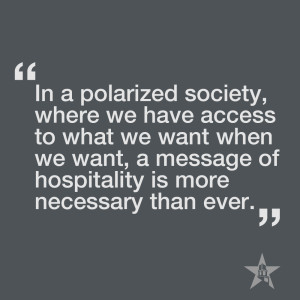I grew up going to a small public school: this meant that though I grew up with close friends who shared similar values, I also grew up with many people who shared quite different values. It was difficult at times, but more than anything, this childhood environment challenged me daily to learn from, and interact with, people different than myself.
 Since coming to college I have comfortably settled into a demographic of like-minded people: Houghton students, are, for the most part, a homogeneous group of Christian believers somewhere in their late teens to early twenties. Yes, our outlooks do differ, but very seldom are these differences extreme. Until recently, besides my annual summer night at the Allegany County Fair, I had not spent much time outside of Houghton.
Since coming to college I have comfortably settled into a demographic of like-minded people: Houghton students, are, for the most part, a homogeneous group of Christian believers somewhere in their late teens to early twenties. Yes, our outlooks do differ, but very seldom are these differences extreme. Until recently, besides my annual summer night at the Allegany County Fair, I had not spent much time outside of Houghton.
However, this past summer working far from home, I was, for the first time in my life, divorced from all familiar faces and in a place where Christianity (along with every other faith) was among a small minority of co-workers. I was immersed in a diverse employee demographic: people varied greatly in ages, in work- and life- experience, were from all over the world and from almost every type of background. It sounds strange, but in the mountains of Montana I found myself in “culture shock”- where were ‘my people?’ Where were the professing believers and the academic enthusiasts?
At first this culture shock was overwhelming. I thought about leaving early: yet, I quickly found relief, because I realized this group of diverse people were, perhaps, the most welcoming group of individuals I had ever been among. By and large, we, co-workers, knew each other’s problems, we knew each other’s opinions, and for all our differences, we accepted each other. Sure, I did not share many values with most co-workers. There were numerous times I still felt uncomfortable, but I learned to both relate to people with what was shared and, as cliché as it sounds, to appreciate others for our differences.
 In John Caputo’s book, What Would Jesus Deconstruct? he discusses philosopher Jacques Derrida’s reflections on the concept of hospitality. Hospitality, in general terms, is the welcoming of the Other, of the different individual, into the same, into one’s own ‘circle of concern’ as philosopher Martha Nussbaum would say. In a polarized society, where we have access to what we want when we want, a message of hospitality is more necessary than ever. Anyone can click to the news website they want or the TV show they prefer without a second thought. No need to go outside what is comfortable.
In John Caputo’s book, What Would Jesus Deconstruct? he discusses philosopher Jacques Derrida’s reflections on the concept of hospitality. Hospitality, in general terms, is the welcoming of the Other, of the different individual, into the same, into one’s own ‘circle of concern’ as philosopher Martha Nussbaum would say. In a polarized society, where we have access to what we want when we want, a message of hospitality is more necessary than ever. Anyone can click to the news website they want or the TV show they prefer without a second thought. No need to go outside what is comfortable.
Therefore, in relation to our current age, Caputo not only clarifies Derrida’s ideas, but brings them into Christian conversation by stating that in order for someone to be hospitable no actual ‘invitation’ will exist, since everyone- neighbor or stranger, friend or enemy- will be welcome. This understanding, of course, brings quite a bit of risk into play: how can we ever be safe from inviting someone or something harmful in? The answer is simple and one Christians may often shy away from: if one eliminates risk, then hospitality is no longer possible. It is simple, with hospitality comes risk.
However, this truth should not frighten Christians away from practices of hospitality. Caputo elaborates, “There is always risk in everything worthwhile” (77). There is something worthwhile in taking a chance and learning to spend time with people different than oneself. The mystery of the unknown can cause one to gain greater understanding, to grow, to learn, and ultimately to strive for further hospitality.
Inevitably, everyone will fail when it comes to being hospitable for, as we all know, no one is perfect. However, just as one strives for unconditional love, one should strive for hospitality.
To relate Caputo’s points back to my own personal experience, when I was younger I could have refused to go to public school. This summer I could have decided to come home early. However, I didn’t. And I think that for all the challenges I faced, both my decisions to stay, to learn and to grow in discourse with the Other were powerful, life-changing, experiences.
Most of you reading this probably know the parable of Luke 14. The rich man invites the poor, the lame, the criminal, into his house for a Banquet feast. As followers of Christ we, likewise, should invite the Other into our lives. Or, if we feel so inclined, we should go out and seek experience with the Other.
For each individual, being hospitable and reaching out to the Other may vary; on our campus, it may challenge an individual to commune with a member of the opposite political party, a member of the L.I.F.E. Club, or a member of the LGBTQ community. Essentially, people must stop viewing those different as only separate and/or harmful- people deserve attention, love, respect, and hospitality. Therefore, I encourage you to take a chance and see what happens when you decide to chase after that crazy concept of hospitality and venture beyond the limits of the familiar.
